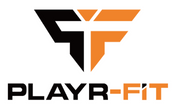On Thursday, September 7th, 1988, Dundalk played host to Red Star Belgrade in the European Cup. The Serbian, ex-Yugoslav, giants are regarded as one of the best sides to have graced Oriel Park. Gavin McLaughlin takes a look back at a night when Red Star’s ‘blond number seven’ caught the eye.
Even in a pre-internet era, Red Star Belgrade held something of an allure to your writer, a then six-going-on seven-year-old, with a love of Dundalk and Manchester United.
Red Star was the club that played host to the Busby Babes in their last-ever match, a European Cup tie that ended 3-3 on February 5th, 1958. I can still recall watching the old video footage of the game, amazed by the patches of snow on the pitch and the red and white painted goals. A day later, Busby’s brilliant young side was tragically ripped apart, their plane careering off an icy runway in Munich after stopping to refuel.
The chance for me to see them in the flesh arrived on September 7th, 1988 when a squad packed with eight Yugoslav internationals arrived in town. It was my first European night at Oriel Park. Sadly, I was too young to appreciate how good Red Star’s performance was but, from the archive footage and reports, those who were in attendance witnessed something special.
Dundalk FC was one of 30 clubs in the European Champions Cup first round, first-leg draw which took place in Switzerland two months earlier. Reigning holders PSV Eindhoven were handed a bye to the second round while the hat contained champions – and only champions – from each country. There was one notable exception: England, the ban on clubs following the Heysel Stadium disaster entering its third season. No seedings, no group stages, just two-legged knockouts right through to the final. David vs. Goliath in an era where David had a sliver of a chance.
The International Hotel in Geneva is where Dundalk learned of their fate but there was real confusion amongst the travelling party of chairman, Eamonn Hiney, director, Enda McGuill and FAI official, Des Casey when the Lilywhites were pulled out second last, paired against ‘Crevna Zvezda’. “We never heard of them!” explained Hiney afterwards. It’s fair to say there was a huge sense of relief when it transpired that Red Star’s Yugoslav name had been called out!
Hiney was soon made aware of just how glamorous a tie Dundalk had landed.
“When we were paired with Red Star there was a standing ovation in the room and we were surrounded by TV crews,” he said. “I could not understand why, because it did not happen with any other draw, but it was explained afterwards to us that Red Star were regarded as a plumb draw and the one that most clubs wanted.”
For Dundalk manager Turlough O’Connor, Red Star – after AC Milan and Celtic – was the team he wanted his double winners to test themselves against. Red Star were beaten by Real Madrid on away goals at the quarter-final stage two seasons earlier so O’Connor knew exactly what his players were up against. Despite that, it was a challenge he was looking forward to.
“They are a crack side, one of the best in Europe, who love to play football and it will be a pleasure to test our ability against them,” he said.
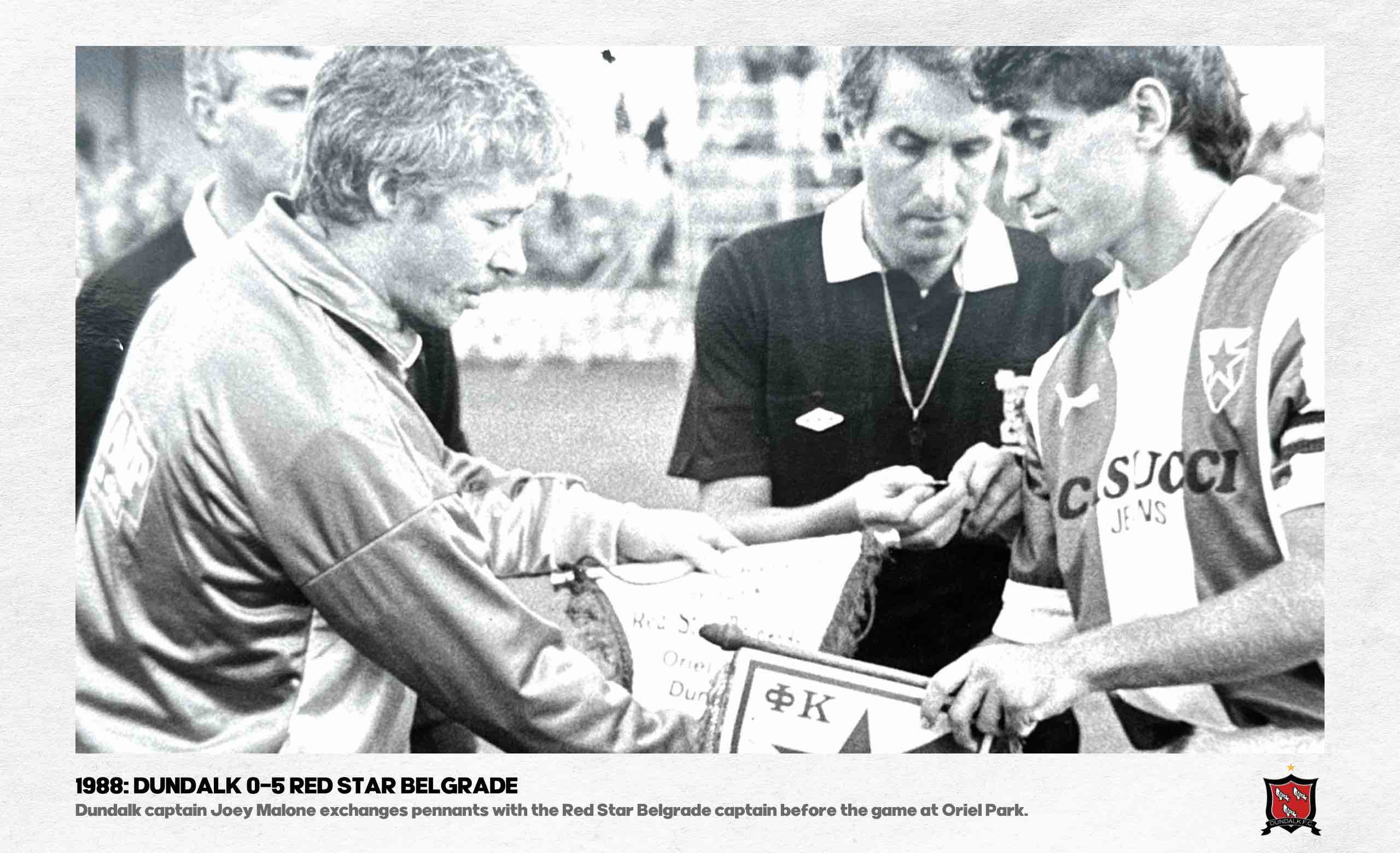
This was Dundalk’s second European meeting with a country from the old Yugoslavia. In 1977, they met Hajduk Split, winning the first leg at Oriel Park thanks to a Terry Flanagan goal before falling to a 4-0 defeat in the return game. In 2014, and with the Iron Curtain a thing of the past, Dundalk returned to Split, now a part of Croatia. My apartment was located across the road from the old Hajduk Stadium where the 1978 game was played. Less than a mile away, Stephen Kenny’s Dundalk beat Hajduk 2-1 on a memorable night at the Station Poljud, bowing out of the Europa League 3-2 on aggregate.
O’Connor’s side went into the Red Star game looking to maintain their unbeaten start to the 1988/89 season. A comfortable 2-0 win over Shamrock Rovers in a League Cup semi-final at Oriel Park 10 days earlier was followed by a 1-1 draw with Jim McLaughlin’s Derry City team that would go on and win the domestic treble. Barry Kehoe scored a 64th-minute equaliser, guiding a 20-yard strike into the top right-hand corner of the Derry net. The game at The Brandywell was played just over 72 hours before the clash with Red Star. No free weekends back then!
Preparations were also a tad different with the Dundalk manager opting not to go and watch Red Star in action. A disjointed pre-season, which saw a number of Dundalk players in action with the Irish Olympic squad, meant that O’Connor wanted to work with his players on a modified 4-4-2 system in place of his usual 4-3-3. “We have done this quite successfully before and I think we have the players to change the system,” he said ahead of the game.
In its match preview, the Dundalk Democrat stated that: ‘Red Star are known for their open type football and their panel includes eight national team players. Wednesday’s fixture promises to be a great game and Dundalk can be expected to throw everything at the Yugoslavs and hope to head to Belgrade with a win under their belts.’
Unfortunately, that proved to be wishful thinking. Going with the same XI that played in Derry, Dundalk just couldn’t find the goal they needed to cap a fine first-half display and Red Star ran riot after the break with the Democrat stating that the Lilywhites ‘found out what it was like to be in the fast lane of European football’.
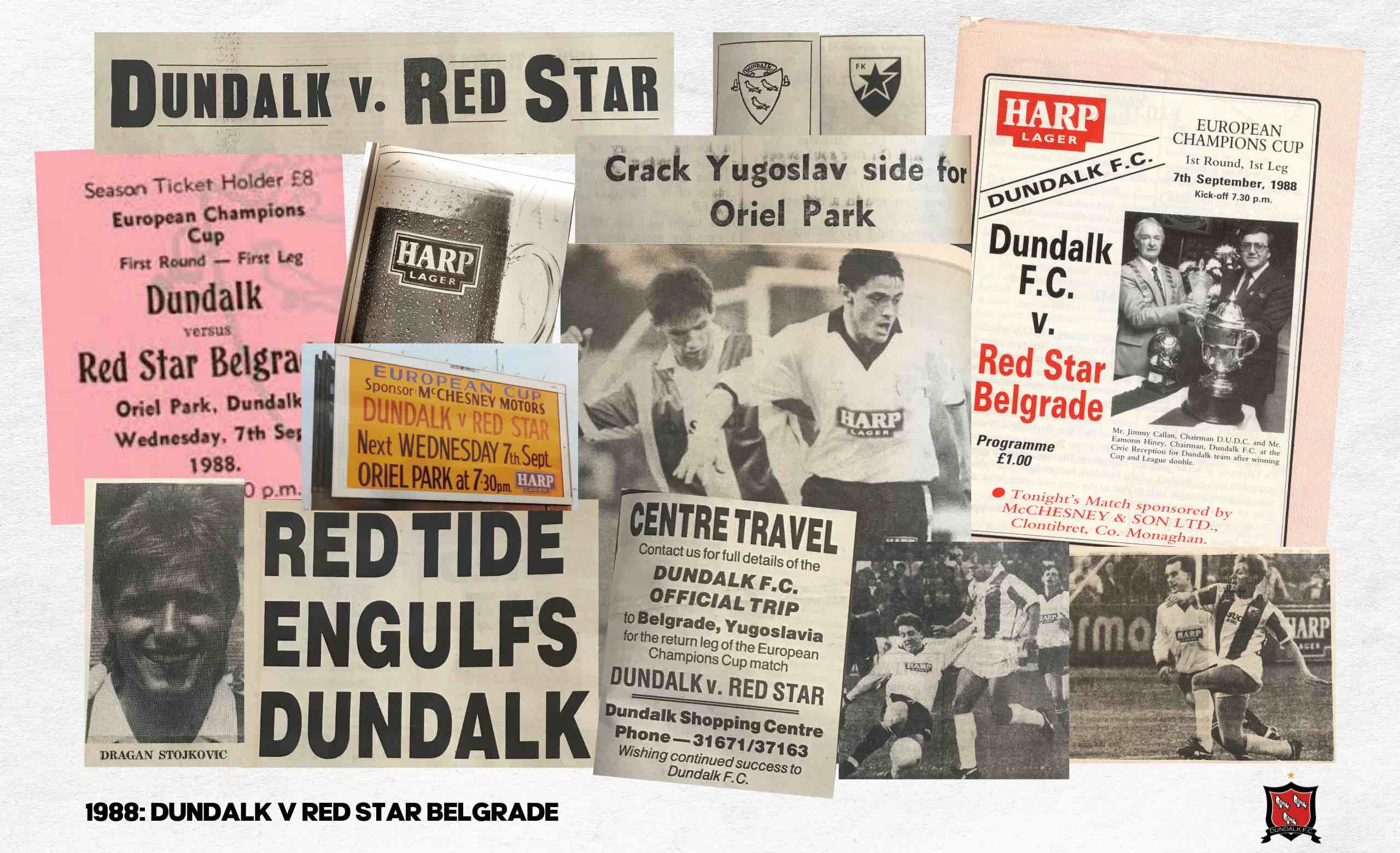
Martin Murray and Dessie Gorman caused Red Star a host of problems early on with the hometown boy just failing to meet a cross from the midfielder, a swirling breeze not helping ‘The Hawk’s’ attempt to judge the delivery. Terry Eviston and Larry Wyse also tested goalkeeper Branko Davidovic with Kehoe’s heavy touch denying him a chance to run clear on the Red Star netminder.
Things were turned upside down when Red Star bagged an away goal in the 51st minute through Dimitrije ‘Mitar’ Mrkela and they took the tie by the scruff of the neck with the wonderfully named Dragan Stojkovic – a wonderful player also – adding a further two, one from the penalty spot, to kill Dundalk off. The tricks started to appear after that with the Democrat reporting that Red Star’s ‘blond number seven’ gave Martin Lawlor a torrid time! More on him later.
It looked like the League of Ireland champions would escape with just a three-goal caning but Red Star racked up two more in the dying stages with substitute Vlada Stosic firing home after Alan O’Neill’s goal took a hammering before Bosko Djurouski made it 5-0, condemning the Lilywhites to their heaviest ever European home defeat.
‘There has been plenty of criticism in the past about Dundalk teams failing to serve up attractive football, even if they were getting the results,’ stated the Demo in its reaction piece. ‘Perhaps, therefore, it is only fair to describe the outcome as the supporters getting the sort of football display they were looking for, even if their team lost heavily.’
While there was no shame in losing to a crack European side, there was some dismay by the turnout with just 3,200 coming through the turnstiles at Oriel – a far cry from the 11,000 at The Brandywell for Derry City’s European Cup Winners Cup tie with Cardiff City and the 8,000 at Tolka Park for St Patrick’s Athletic’s UEFA Cup tie with Hearts. Gate receipts came to approximately €15,000, €10,000 short of the estimated cost of the return trip to Belgrade four weeks later.
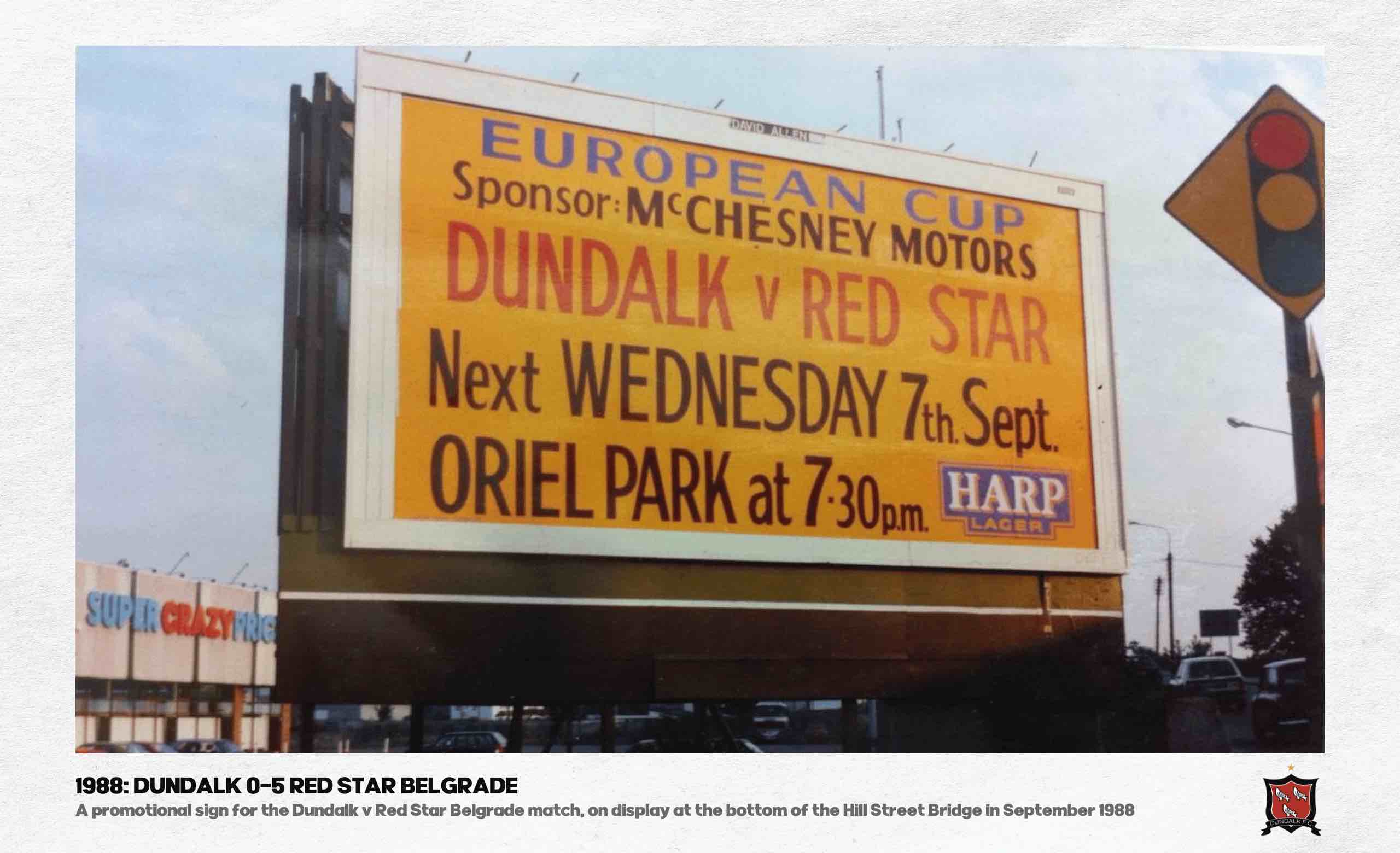
There was some financial gain for Dundalk as the officials for the first leg came from Scotland, something which pleased the club’s board immensely. It had nothing to do with their nationality, mind you. Money was the main motivation with the club citing the cost of the Swedish officials for the previous year’s Cup Winners Cup tie with Ajax as one of the greatest single items of expense in connection with the fixture.
A full four weeks passed until the second leg in Belgrade. In between, Dundalk won four and drew two of their domestic matches, but expectations were low when they left Dublin Airport two days before the game.
“It’s the nearest thing to an impossibility,” said Barry Kehoe. “Our pride was hurt by that 5-0 first-leg drubbing and we will be going out to try and prove that the result was a fluke.”
The Lilywhites produced another battling display in front of 28,000 supporters at the Red Star Stadium on October 5th but any hopes of a miraculous comeback were shattered when the hosts scored after just three minutes with Mrkela going on to add two more. Martin Murray went closest to pulling one back, hitting the woodwork in the second half, and the Yugoslav public recognised the gutsy effort by Dundalk over the two legs, giving them a standing ovation at full-time. It was a scene repeated in Split 26 years later when Kenny’s players were applauded off the pitch after beating Hajduk on their own patch.
Red Star’s reward for beating Dundalk was a second-round tie against AC Milan. After a 1-1 draw at the San Siro – Stojkovic scoring a superb goal – Red Star went a goal up in Belgrade when Dejan Savicevic – who went on to sign for the Rossoneri – smashed the ball home to leave Arrigo Sacchi’s star-studded and 10-man Milan facing elimination. Thick fog, however, descended on the stadium, forcing West German referee Dieter Pauly to call the game off with 57 minutes played.
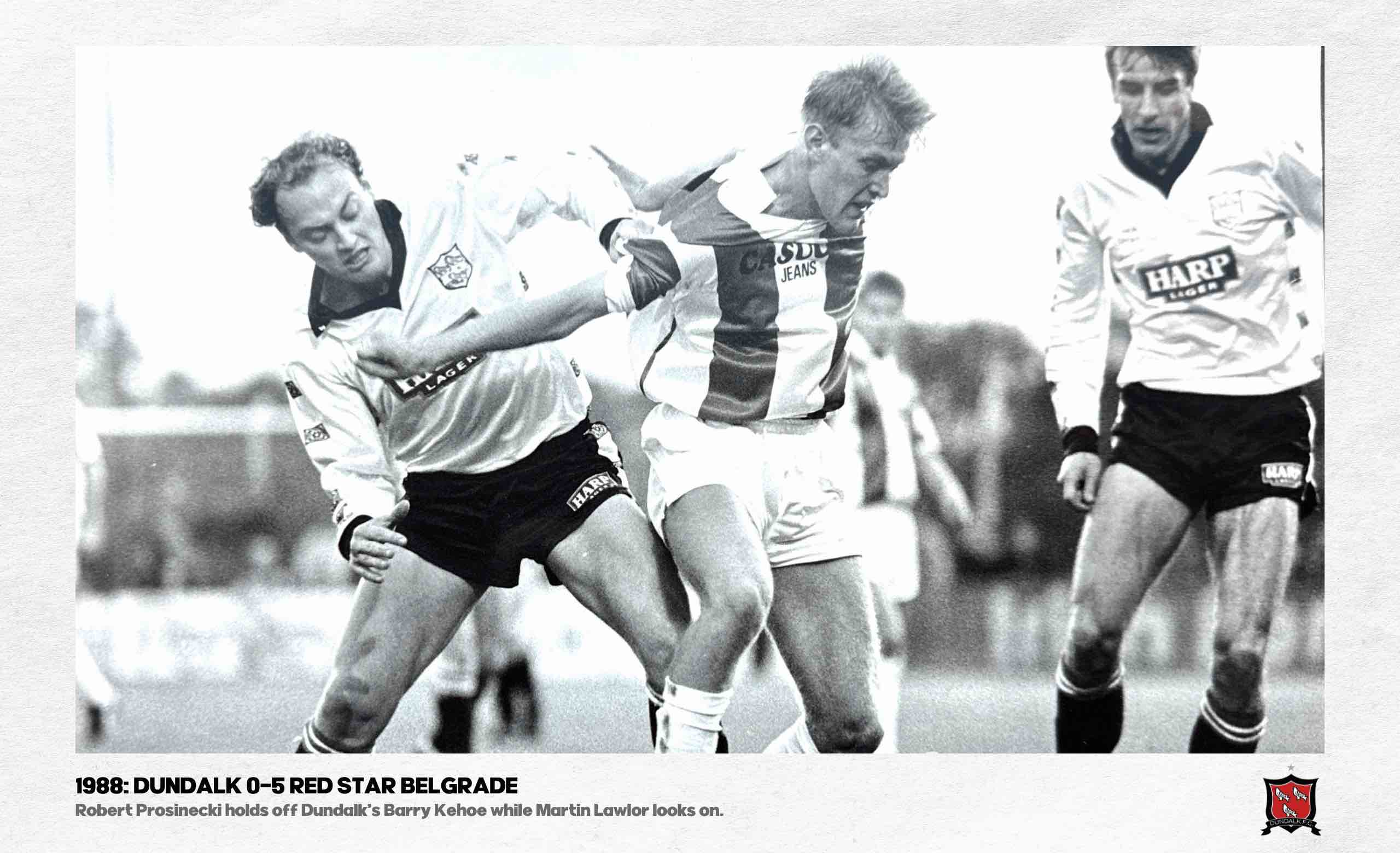
Incredibly, Red Star coach Vladimir Petrovic agreed to replay the game from scratch the following day and with Ruud Gullit back in the starting line-up, Milan went ahead through Marco Van Basten. Stojkovic equalised, making it 2-2 on aggregate, but Milan won 4-2 on penalties and lifted the trophy by hammering Steaua Bucharest in the final at the Camp Nou in Barcelona.
A round-three exit in the UEFA Cup followed in 1990 before Red Star took the big step and won the European Cup a year later, beating Marseille 5-3 on penalties in Bari. Ironically, Stojkovic was named amongst the Marseille substitutes after moving to France at the beginning of that season while the Red Star XI contained two of the Red Star players who played at Oriel Park, defender Reflik Sabanadzovic and the ‘blonde number seven’ Robert Prosinecki.
Eight years after his impressive performance in the 5-0 win, a link between ’88 and ’96 was established as Prosinecki – who played in three World Cups and lined out for both Real Madrid and Barcelona – returned to the Carrick Road. As part of their EURO 96 preparations, the Croatian national side stayed at the Nuremore Hotel and trained at Oriel for a week ahead of their participation in the tournament in England.
Prosinecki, along with the likes of Zvonimir Boban, Daver Suker, Slaven Bilic, Robert Jarni and Alan Boksik enjoyed relative anonymity just weeks before they lit up the Euros, Croatia eventually being beaten in the last eight by Germany. Now 14, I watched in awe as these household European names paraded their full array of skills in front of me at Hiney Park with Prosineki, openly smoking cigarettes after training, looking comfortable in his surroundings.
Simpler times, happier times, magical times.
DUNDALK FC: Alan O’Neill, Dave Mackey (Mick Shelley 70), John Cleary, Joey Malone, Martin Lawlor (Jim Gannon 76); Larry Wyse, Gino Lawless, Barry Kehoe, Martin Murray; Terry Eviston, Dessie Gorman. Subs not used: Paul Newe, Francie Callan, Tommy Quinn.
RED STAR BELGRADE: Branko Davidovic, Goran Juric, Goran Vasilijevic, Reflik Sabanadzovic (Enes Besic 60), Slavko Radovanovic, Ilija Najdoski (Vlada Stosic 74), Robert Prosinecki, Bosko Gjurovski, Husref Musemic, Dragan Stojkovic, Dimitrije ‘Mitar’ Mrkela. Subs not used: Stevan Stojanovic, Slobodan Marovic, Milos Bursac.
REFEREE: Jim McCluskey (Scotland).







